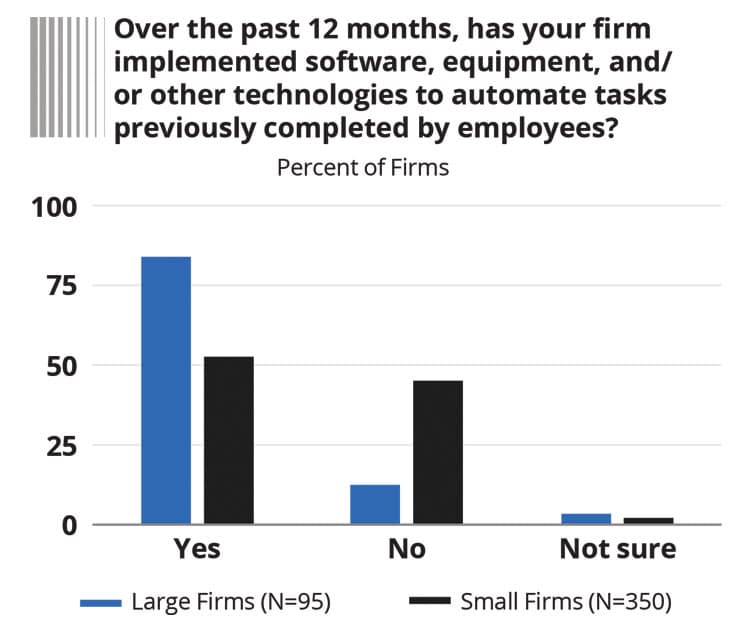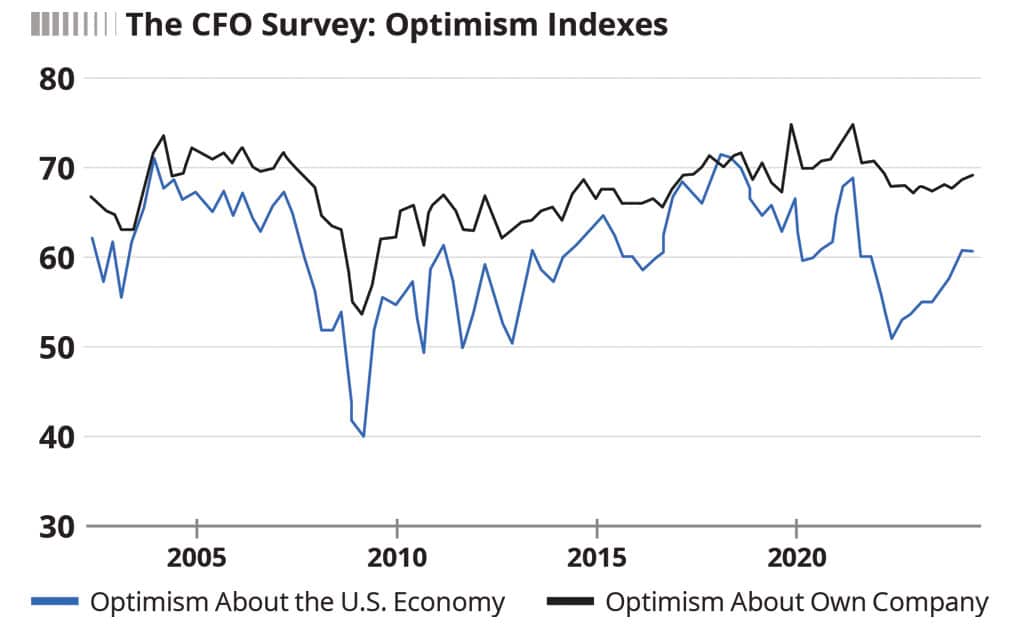As an industry-specific cloud software company, every quarter we have to read all the analyst reports and a mind-numbing number of studies.
This research is important to help us learn about the outlook of our customers, our industries and about the market. This is especially important when inflation persists and, when we feel like economic uncertainties loom.
One survey, The CFO Survey, which is a collaboration between Duke University’s Fuqua School of Business and the Federal Reserve Banks of Richmond and Atlanta, clearly shows how fast U.S. companies are increasingly turning to automation and AI to sustain growth and maintain competitiveness.
The survey reveals that nearly two-thirds of CFOs state their top priority is automating tasks typically performed by employees, with a significant majority planning to integrate AI in the next 12 months.
Automation and AI as top priorities is not a surprise to the software industry. It’s why we have been developing AI and Enterprise Automation solutions for years. There were two surprising pieces of data hidden in this survey, however, both of which help solidify why investing in an AI platform is a timely and strategic move for businesses in this climate.
We were shocked to learn 60% of companies had already replaced employees with technology. We were also amazed by how stable the optimism of the CFOs is about the future.
Last Year’s Surge in Automation and AI Adoption
The survey, which closed on June 3, shows a robust trend toward automation. Over the past year, nearly 60% of companies have already adopted software, equipment or technology to automate tasks traditionally handled by employees. Among large companies, this figure jumps to 84%.

The primary motivations for this shift include:
- Increasing Product Quality (58%)
- Boosting Output (49%)
- Reducing Labor Costs (47%)
- Substituting for Workers (33%)
Notably, 37% of these companies, and 55% of large firms, have already implemented AI. These statistics underscore a growing reliance on AI to drive efficiency and innovation across operational domains.
Your suppliers, competitors and customers are already automating processes. If you are lagging, they will undercut your pricing and erode your margins.
Next Year’s Goals: Addressing Economic and Operational Challenges
The most startling statistic in this survey is CFOs’ confidence about their own companies. This number remains stable at near the all-time high. Overall CFO optimism remains stable, with confidence levels holding steady from last quarter.
While small companies show cautious optimism compared to their larger counterparts, the overall outlook remains positive. Real GDP growth is projected at a healthy 1.8% over the next 12 months, showing only a slight decrease from the previous quarter’s 2.2%. This resilient economic outlook, combined with strategic investments in AI, positions businesses to effectively navigate challenges and capitalize on emerging opportunities.

U.S. CFOs have highlighted key concerns for the upcoming year, including monetary policy, inflation and workforce challenges. The ongoing inflation, with 57% of companies expecting above-normal price increases, represents great earning potential for distributors and emphasizes the need for cost-effective solutions. Automation and AI platforms addresses these challenges by:
- Optimizing Costs: Automation and AI reduce dependency on labor, lowering costs while maintaining or improving output and quality.
- Improving Decision-Making: AI-driven insights enhance financial reporting and procurement processes, enabling better decision-making amidst economic uncertainties.
- Retaining Talent: By automating repetitive tasks, companies can focus on higher-value activities, improving job satisfaction and retention.
The moderate economic outlook, coupled with a strong push towards automation, makes investment in AI platforms not just a choice but a necessity for staying competitive.
Search for an AI platform that offers a versatile, scalable and comprehensive solution that aligns with the strategic priorities of today’s CFOs. As businesses navigate the complexities of inflation and economic volatility, these will stand as pivotal tools in driving efficiency, innovation and growth.
If you are struggling and find yourself behind, just call your ERP vendor. Investing now will position companies to thrive in an increasingly automated and AI-driven future.
Steve Levy is a true visionary and a game-changer in the world of enterprise architecture. As the Vice President of Enterprise Architecture for the distribution industry at Infor, he is a driving force behind the success of some of the world's largest and most complex distributors. Steve's impressive track record of digital transformation and innovation is unparalleled. With his leadership, his team has helped Infor's customers establish cutting-edge enterprise ecosystems that have revolutionized the way they do business. Before joining Infor, he honed his skills and expertise working in the distribution industry. Steve was the Executive Vice President at a wholesale paper distributor. With his extensive experience and unmatched talent, Steve is undoubtedly one of the most impressive and sought-after experts in the field of enterprise architecture today.


1 thought on “Top Priority for CFOs: Replace Labor with AI Automation”
I found the article really insightful! It’s fascinating to see how AI can take over repetitive tasks and allow CFOs to focus on strategic decisions. Excited to see how this evolves!